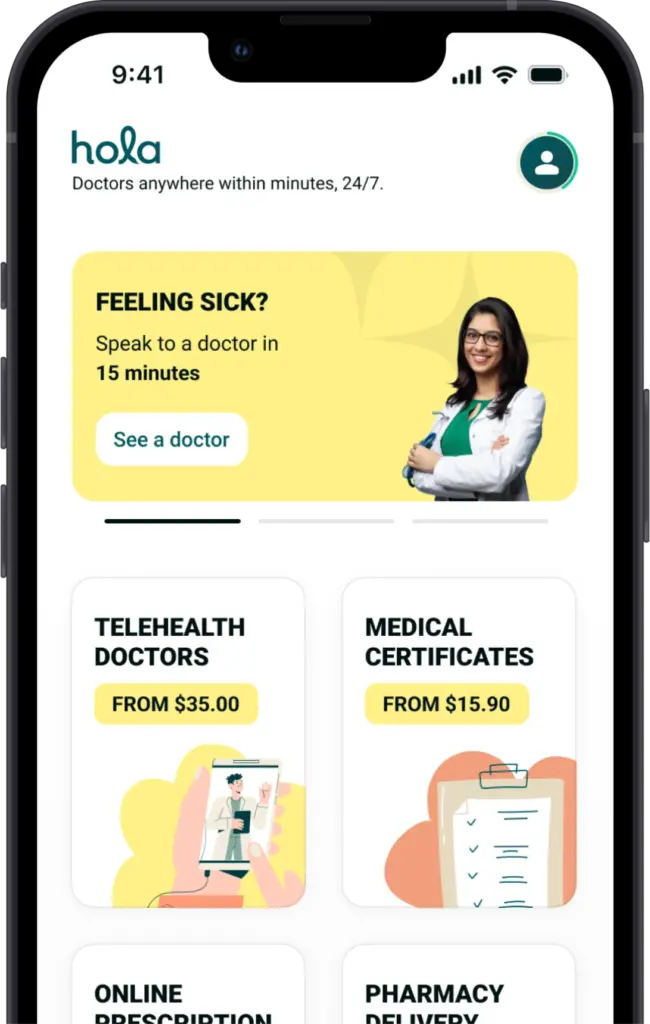- Home
- /
- Health Conditions
- /
- Chest Infection
Chest Infection
A chest infection is a common illness in Australia, affecting the lungs or airways. It can range from a mild, self-limiting condition like acute bronchitis to a more serious infection like pneumonia. Speak to registered practitioners regarding chest infection from anywhere in Australia within 15 minutes, 24/7.
4.6/5 based on 28000+ reviews
How our doctors can help
Online GP consultation
100% Bulk Billed*
Medical certificates
From $14.90
Specialist referrals
From $39
Prescriptions
100% Bulk Billed*

When to consult a doctor for chest infection?
If symptoms are severe or worsening
Consult a doctor if your cough lasts longer than 7–10 days, gets worse, returns after initially improving, or if you have a high fever (over 38°C) that doesn’t settle with medication.
If you experience breathing related issues
Seek medical advice if you have breathlessness or wheezing (especially at rest), chest pain when breathing or coughing, or are coughing up yellow, green, or bloody mucus.
If you are high-risk or feel unusually unwell
See a doctor if you feel extreme fatigue, dizziness, or confusion, or if you are an older adult, pregnant, a young child, or have conditions such as asthma, COPD, heart disease, or diabetes.
This guide does not replace professional care. Consult a doctor to manage your symptoms. In emergencies, call 000. The content is research-backed & medically reviewed by Dr. Ammar AL-ANI, MBChB, CCBST, AMC
Chest Infection causes
- Viral infections: The most common cause of chest infections like bronchitis and bronchiolitis, especially in colder months. Viruses such as influenza, RSV, and adenoviruses are frequent culprits.
- Bacterial infections: Can cause more serious chest infections like pneumonia.
- Weakened immune system: People with chronic illnesses, the elderly, infants, and those on immune-suppressing medications are at higher risk.
- Smoking: Damages lung tissues and impairs the airways’ natural defence, making infections more likely.
- Chronic respiratory conditions: Asthma, COPD, or cystic fibrosis increase susceptibility to infections.
- Exposure to pollutants: Dust, chemicals, and smoke irritate airways and lungs, raising infection risk.
- Close contact with infected people: Chest infections often spread through droplets from coughing or sneezing.
Chest infection symptoms
- Persistent cough
- Chest pain or discomfort
- Shortness of breath or wheezing
- Fever and chills
- Fatigue and body aches
- Loss of appetite
- Headache and sore throat
- Rapid heartbeat (palpitations)

Types of chest infections
Bronchitis
- The most common type.
- Involves inflammation of the bronchial tubes (the airways leading to your lungs).
- Often caused by viruses, occasionally bacteria.
- Symptoms: persistent cough, chest tightness, mild fever, and mucus production.
Pneumonia
- A more serious infection of the lung tissue itself.
- Can be caused by bacteria, viruses, or fungi.
- Symptoms: high fever, chills, breathlessness, chest pain, fatigue, and thick mucus.
- Common in babies and young children.
- Involves inflammation of the small airways (bronchioles).
- Caused mostly by viruses like RSV (Respiratory Syncytial Virus).
Tuberculosis (TB)
- Less common in Australia but still occurs.
- Caused by the bacteria Mycobacterium tuberculosis.
- Symptoms: chronic cough, night sweats, weight loss, and fatigue.
Prevention and home remedies
- Rest and Environment: Prioritize sleep with your head elevated and avoid smoking or alcohol to speed up recovery.
- Hydration and Nutrition: Drink plenty of warm fluids and eat nutrient-rich, light meals to support your immune system and loosen mucus.
- Congestion Relief: Use steam inhalation or a humidifier to ease chest tightness and practice gentle breathing exercises.
- Professional Advice: Consult a healthcare practitioner before starting any medication or if your symptoms worsen.

Speak to our doctors 24/7
Providing consults for
Helpful resources

Download our Mobile App for better performance
- Book appointments instantly.
- Stay connected wherever you are.
- Experience healthcare, uninterrupted.
 Scan the QR Code to download the app instantly
Scan the QR Code to download the app instantly 

